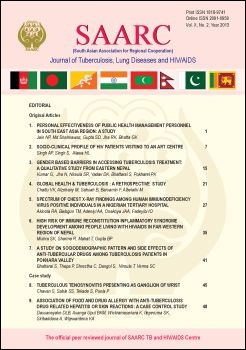Gender Based Barriers In Accessing Tuberculosis Treatment: A Qualitative Study From Eastern Nepal
DOI:
https://doi.org/10.3126/saarctb.v10i2.9708Keywords:
Delay, Gender, Nepal, TuberculosisAbstract
Introduction: Previous studies have demonstrated longer length of delays in diagnosis and treatment among men and women, especially among women experiencing longer duration of delay in accessing tuberculosis treatment. So, the study was conducted to explore responsible factors among men and women affecting longer duration in accessing tuberculosis treatment.
Methodology: Qualitative approach with FGD sessions among people from community, DOTS providers and pulmonary tuberculosis patients were conducted separately in between March 2012 to May 2012.
Results: The perception of fear, hiding symptoms, social stigmas and traditional beliefs were common among women. The study revealed that social and cultural barrier, ignorance of symptoms, home remedies, fear of stigma, access to health centre from rural areas, poor knowledge of TB signs and symptoms, beliefs on traditional healers were the common reason for the longer delays in diagnosis.
Conclusions: The fi ndings suggested that knowledge, information, perception regarding TB among men and women were lacking, especially among females. This warrants awareness for early diagnosis and control of disease.
SAARC Journal of Tuberculosis, Lung Diseases & HIV/AIDS; 2013; X(2); 15-20
Downloads
Downloads
Published
How to Cite
Issue
Section
License
Copyright © SAARC Tuberculosis and HIV/AIDS Centre (STAC), all rights reserved, no part of this publication may be reproduced, stored in a retrieval system or transmitted in any form or by any means without prior permission of the STAC.





